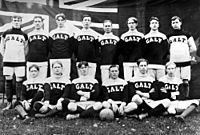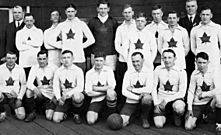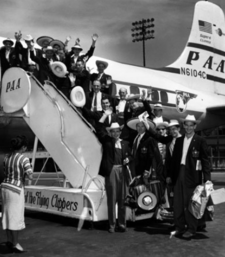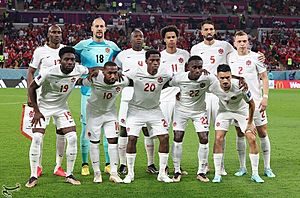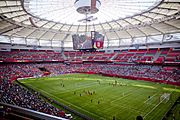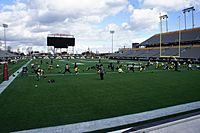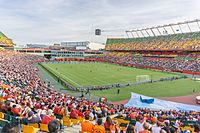Canada national soccer team facts for kids
{{infobox national football team | Name = Canada | Badge = Canada-Badge-Outline.png | Badge_size = 190px | Nickname = | Association = Canadian Soccer Association | Confederation = CONCACAF | Sub-confederation = NAFU | Coach = John Herdman | Captain = Atiba Hutchinson | Most caps = Atiba Hutchinson (104) | Top scorer = Cyle Larin (28) | FIFA Trigramme = CAN | Home Stadium = Various | FIFA Rank = 79 ![]() 1 (February 7, 2019) | FIFA max = 33 | FIFA max date = February 2022 | FIFA min = 122 | FIFA min date = August 2014, October 2014 | Elo Rank = 68
1 (February 7, 2019) | FIFA max = 33 | FIFA max date = February 2022 | FIFA min = 122 | FIFA min date = August 2014, October 2014 | Elo Rank = 68 ![]() 8 (March 3, 2019) | Elo max = 21 | Elo max date = February 2022 | Elo min = 92 | Elo min date = May 1975, June 2014 | pattern_la1 = _ nikestrike3ur | pattern_b1 = _ nikestrike3ur | pattern_ra1 = _ nikestrike3ur | pattern_sh1 = | pattern_so1 = | leftarm1 = FF0000 | body1 = FF0000 | rightarm1 = FF0000 | shorts1 = FF0000 | socks1 = FF0000 | pattern_la2 = | pattern_b2 = _kashima13a | pattern_ra2 = | pattern_sh2 = | pattern_so2 = | leftarm2 = FFF | body2 = FFFFFF | rightarm2 = FFF | shorts2 = FFF | socks2 = FFF | pattern_la3 = | pattern_b3 = _nikepark7b | pattern_ra3 = | pattern_sh3 = _ | pattern_so3 = _ | leftarm3 = 000000 | body3 = 000000 | rightarm3 = 000000 | shorts3 = 000000 | socks3 = 000000 | First game =
8 (March 3, 2019) | Elo max = 21 | Elo max date = February 2022 | Elo min = 92 | Elo min date = May 1975, June 2014 | pattern_la1 = _ nikestrike3ur | pattern_b1 = _ nikestrike3ur | pattern_ra1 = _ nikestrike3ur | pattern_sh1 = | pattern_so1 = | leftarm1 = FF0000 | body1 = FF0000 | rightarm1 = FF0000 | shorts1 = FF0000 | socks1 = FF0000 | pattern_la2 = | pattern_b2 = _kashima13a | pattern_ra2 = | pattern_sh2 = | pattern_so2 = | leftarm2 = FFF | body2 = FFFFFF | rightarm2 = FFF | shorts2 = FFF | socks2 = FFF | pattern_la3 = | pattern_b3 = _nikepark7b | pattern_ra3 = | pattern_sh3 = _ | pattern_so3 = _ | leftarm3 = 000000 | body3 = 000000 | rightarm3 = 000000 | shorts3 = 000000 | socks3 = 000000 | First game = ![]() Australia 3–2 Canada
Australia 3–2 Canada ![]()
(Brisbane, Australia; June 7, 1924) | Largest win = ![]() Cayman Islands 0–11 Canada
Cayman Islands 0–11 Canada ![]()
(Bradenton, United States; March 29, 2021) | Largest loss = ![]() Mexico 8–0 Canada
Mexico 8–0 Canada ![]()
(Mexico City, Mexico; July 18, 1993) | World cup apps = 2 | World cup first = 1986 | World cup best = Group stage (1986, 2022) | Regional name = CONCACAF Championship / Gold Cup | Regional cup apps = 19 | Regional cup first = 1977 | Regional cup best = Champions (1985, 2000) | 2ndRegional name = Nations League Finals | 2ndRegional cup apps = 1 | 2ndRegional cup first = 2023 | 2ndRegional cup best = Runners-up (2023) | website = | medaltemplates =
|- ! colspan="3" style="text-align:center;vertical-align:middle;background-color:#cccccc;" | CONCACAF Gold Cup
|- align=center valign=middle bgcolor=white |bgcolor=gold| Gold|| 1985 North America|| Team
|- align=center valign=middle bgcolor=white |bgcolor=gold| Gold|| 2000 United States|| Team
|- align=center bgcolor=white |bgcolor="#cc9966"| Bronze || 2002 United States || Team
|- ! colspan="3" style="text-align:center;vertical-align:middle;background-color:#cccccc;" | Olympic Games
|- align=center valign=middle bgcolor=white |bgcolor=gold| Gold|| 1904 St. Louis || Team
The Canada men's national soccer team (also known as Équipe du Canada de soccer masculin in French) plays for Canada in international soccer games. The team is managed by the Canadian Soccer Association, which is the main group for soccer in Canada. Canada has been a member of FIFA since 1948 and CONCACAF since 1961.
Some of their biggest wins include taking home the 1985 CONCACAF Championship and the 2000 CONCACAF Gold Cup. Winning these tournaments helped them get into the 1986 FIFA World Cup and the 2001 FIFA Confederations Cup. Canada is special because it's the only team besides Mexico and the United States to win a Gold Cup. They also won a gold medal at the 1904 Summer Olympics.
Canada played in its second World Cup in 2022. They will also be one of the host countries for the 2026 FIFA World Cup, along with the United States and Mexico.
Contents
Canada's Soccer Journey
How it All Started
Soccer has been played in Canada for a very long time. Early groups like the Dominion Football Association (1877) and Western Football Association (1880) helped set up the game. These groups came before today's Canadian Soccer Association.
In 1885, a Canadian team played against a team from the United States in an unofficial friendly game. Canada won 1–0. The next year, the U.S. team won 3–2. In 1888, a Canadian team toured the British Isles, winning nine games, drawing five, and losing nine. Most of the players were born in Canada.
A team called Galt F.C. represented Canada at the 1904 Olympic Games in St. Louis, Missouri. They were one of only three teams. Galt F.C. won both their games, beating two American clubs 7–0 and 4–0, to win the tournament and earn gold medals.
In 1924, the Canadian national team traveled to Australia. They played their first official match there, losing 3–2 to the Australian national team. Canada also played against their old rivals, the United States, in 1925, winning 1–0.
From 1957 to 1987
Canada left FIFA in 1928 because of a disagreement about payments to amateur players. They rejoined in 1946 and played in their first World Cup qualifying games in 1957. This was their first national team game in 30 years!
Canada won their first game against the United States 5–1. But they lost to Mexico twice and missed out on the 1958 FIFA World Cup. Canada did not enter the World Cup for 1962 or 1966. They did play in the 1967 Pan American Games which they hosted in Winnipeg, finishing fourth.
Canada tried to qualify for the World Cup many times but often didn't make it past the early rounds. In 1981, they played very well in the CONCACAF championship qualifiers, even drawing 1–1 against Mexico at the famous Estadio Azteca stadium.
Between 1981 and 1985, Canada's team got much stronger under coach Tony Waiters. They played well at the 1984 Summer Olympics. In 1985, they finally made it to their first World Cup! They won the CONCACAF championship by beating Honduras 2–1. This win sent them to the 1986 FIFA World Cup.
At the 1986 FIFA World Cup, Canada played France in their first game. They only lost 1–0, which was a good effort against a strong team. However, they lost their next two games to Hungary and the Soviet Union, finishing last in their group.
After the World Cup, four Canadian players were suspended for breaking rules during a tournament in Singapore. One player, David Norman, was allowed to play again later, but Igor Vrablic never played for Canada again.
The 1990s and New Challenges
Canada hosted and won the first North American Nations Cup in 1990. They beat the United States and Mexico. John Catliff scored all three of Canada's goals in the tournament.
Canada came very close to qualifying for the 1994 FIFA World Cup under coach Bob Lenarduzzi. They played well in the final qualifying round, even drawing with Honduras and beating El Salvador. They needed a win against Mexico in Toronto to qualify directly, but they lost 2–1.
This meant Canada had to play in special play-off games. They played against Australia, winning the first game 2–1. The second game went to extra time and then a penalty shootout, which Australia won. This ended Canada's dream of going to the 1994 World Cup.
In 1994, Canada played against strong teams like Brazil and Germany. They even held Brazil, who later won the World Cup, to a 1–1 draw!
For the 1998 FIFA World Cup, Canada had high hopes. But they struggled, losing badly to Mexico and the U.S. They finished last in their group and didn't qualify.
The 2000s: Gold Cup Glory
In 1998, Holger Osieck became the new coach. Success came quickly! Canada won the 2000 CONCACAF Gold Cup in February 2000. They surprised everyone by beating Mexico in the quarter-finals. Then, they went all the way to the final and beat Colombia 2–0. This was a huge win for Canadian soccer!
Winning the Gold Cup meant Canada got to play in the 2001 FIFA Confederations Cup. A highlight was holding Brazil to a 0–0 draw.
Canada also did well in the 2002 CONCACAF Gold Cup, reaching the semi-finals. They lost to the United States in a penalty shootout but then won the third-place game against South Korea.
However, Canada struggled again in World Cup qualifiers for 2006. They finished last in their group. Coach Frank Yallop resigned in 2006.
Under interim coach Stephen Hart, Canada had a strong showing at the 2007 CONCACAF Gold Cup. They won their group and reached the semi-finals, where they lost to the United States in a close game.
Canada did not qualify for the 2010 FIFA World Cup. They finished last in their group in the final qualifying round. Stephen Hart was later named the full-time head coach.
The 2010s: Building for the Future
Stephen Hart's team didn't get out of the group stage at the 2011 CONCACAF Gold Cup. For the 2014 FIFA World Cup qualifiers, Canada reached the third round but were eliminated after a tough 8–1 loss to Honduras.
After some changes, Benito Floro became Canada's coach in 2013. The team went through a tough period, not scoring a goal for a very long time (958 minutes!). This streak finally ended in a 1–1 draw with Bulgaria. Canada's FIFA ranking dropped to its lowest ever, 122nd, in August 2014. But they ended a 16-game winless streak by beating Jamaica 3–1.
Canada continued to play in World Cup qualifiers. In 2015, they set a new attendance record for a Canadian men's team game in British Columbia, with over 20,000 fans watching them beat Honduras 1–0. In 2016, a record 54,798 fans watched Canada play Mexico in Vancouver. Canada lost that game 3–0 and did not qualify for the 2018 FIFA World Cup. Coach Floro was then replaced.
In 2018, John Herdman became the new head coach. He had previously coached the successful Canadian women's national team. Under Herdman, Canada qualified for the top division of the new CONCACAF Nations League. They earned a big 2–0 win over the United States in 2019, their first win against their rivals since 1985!
The 2020s: A New Golden Age
The 2020s brought a new group of talented young players to the Canadian team. These include Alphonso Davies of Bayern Munich, who won the UEFA Champions League, and Jonathan David, who became the most expensive Canadian soccer player. The new Canadian Premier League also helped develop players.
Canada had a fantastic run in the qualifiers for the 2022 World Cup. They went unbeaten in their first eleven matches and finished 2021 at the top of the table after beating Mexico. Their FIFA ranking rose to 40th, their highest ever!
On March 27, 2022, Canada beat Jamaica 4–0 to officially qualify for the 2022 FIFA World Cup in Qatar. This was a huge moment, ending a 36-year wait since their last World Cup appearance in 1986. It was even revealed that their kit supplier, Nike, didn't expect them to qualify, so Canada was the only team in Qatar without a special new uniform!
At the World Cup, Canada played Belgium first. They lost 1–0, even though they played very well. Four days later, Alphonso Davies scored Canada's first-ever goal at a FIFA World Cup against Croatia! However, Croatia came back to win 4–1, which meant Canada was out of the tournament. Canada lost their final group game to Morocco 2–1, finishing with zero points. Even so, many people saw this World Cup as a great learning experience for the team, preparing them for the 2026 FIFA World Cup which Canada will co-host.
In 2023, Canada reached the finals of the 2023 CONCACAF Nations League Finals, their first major final in 23 years. They beat Panama 2–0 in the semi-finals but lost to the United States 2–0 in the final.
Big Rivalries
Canada vs. United States
Canada has a friendly but strong rivalry with the United States. They often play each other in the Gold Cup. The U.S. has won more games overall. For a long time, Canada hadn't beaten the U.S. in 34 years!
But that changed on October 15, 2019, when Canada defeated the United States 2–0 in Toronto. Since then, their games have been very exciting. In 2022 World Cup qualifying, Canada drew 1–1 with the U.S. in Nashville and then beat them 2–0 in Hamilton.
Home Stadiums
The Canadian team plays its home games at different stadiums across the country. For the 2022 FIFA World Cup qualifiers, they used BMO Field in Toronto, Commonwealth Stadium in Edmonton, and Tim Hortons Field in Hamilton. BMO Field is Canada's biggest stadium with natural grass. They also played World Cup qualifiers at BC Place in Vancouver.
Team Leaders
Coaching Staff
The current head coach of the Canada men's national soccer team is John Herdman. He leads the team with the help of several assistant coaches.
| Name | Nation | Position |
|---|---|---|
| John Herdman | Head coach | |
| Mauro Biello | Assistant coach | |
| Eric Tenllado | Assistant coach | |
| Jason Perry | Assistant coach | |
| Phil Neville | Assistant coach | |
| Richard Shaw | Assistant coach | |
| Francis Warwick | Goalkeeping coach |
Coaching History (Selected)
Many coaches have led the Canadian team over the years. Some notable ones include:
- Don Petrie (1957)
- Eckhard Krautzun (1973–1977)
- Tony Waiters (1981–1985, 1985–1986, 1990–1991) - Led Canada to its first World Cup.
- Bob Lenarduzzi (1989–1990, 1992–1997)
- Holger Osieck (1999–2003) - Led Canada to the 2000 Gold Cup win.
- Frank Yallop (2004–2006)
- Stephen Hart (2009–2012)
- Benito Floro (2013–2016)
- Octavio Zambrano (2017–2018)
- John Herdman (2018–present) - Led Canada to the 2022 World Cup.
Players on the Team
Current Squad
Here are the players who were part of the team for the 2023 CONCACAF Nations League Finals. The numbers for games played (caps) and goals are correct as of June 18, 2023.
| No. | Pos. | Player | Date of birth (age) | Caps | Goals | Club |
|---|---|---|---|---|---|---|
| 1 | GK | Dayne St. Clair | May 9, 1997 | 2 | 0 | |
| 16 | GK | Tom McGill | March 25, 2000 | 0 | 0 | |
| 18 | GK | Milan Borjan | October 23, 1987 | 75 | 0 | |
|
|
||||||
| 2 | DF | Alistair Johnston | October 8, 1998 | 36 | 1 | |
| 3 | DF | Sam Adekugbe | January 16, 1995 | 41 | 1 | |
| 4 | DF | Kamal Miller | May 16, 1997 | 34 | 0 | |
| 5 | DF | Steven Vitória | January 11, 1987 | 41 | 4 | |
| 6 | DF | Dominick Zator | September 18, 1994 | 0 | 0 | |
| 14 | DF | Moïse Bombito | March 30, 2000 | 0 | 0 | |
| 22 | DF | Richie Laryea | January 7, 1995 | 41 | 1 | |
| 23 | DF | Scott Kennedy | March 31, 1997 | 12 | 0 | |
|
|
||||||
| 7 | MF | Stephen Eustáquio | December 21, 1996 | 32 | 3 | |
| 8 | MF | David Wotherspoon | January 16, 1990 | 11 | 1 | |
| 12 | MF | Victor Loturi | May 21, 2001 | 0 | 0 | |
| 13 | MF | Atiba Hutchinson (captain) | February 8, 1983 | 104 | 9 | |
| 15 | MF | Ismaël Koné | June 16, 2002 | 13 | 1 | |
| 21 | MF | Jonathan Osorio | June 12, 1992 | 64 | 8 | |
|
|
||||||
| 9 | FW | Lucas Cavallini | December 28, 1992 | 36 | 18 | |
| 10 | FW | Junior Hoilett | June 5, 1990 | 55 | 14 | |
| 11 | FW | Tajon Buchanan | February 8, 1999 | 33 | 4 | |
| 17 | FW | Cyle Larin | April 17, 1995 | 62 | 28 | |
| 19 | FW | Alphonso Davies | November 2, 2000 | 41 | 14 | |
| 20 | FW | Jonathan David | January 14, 2000 | 42 | 25 | |
Player Records
These tables show which players have played the most games and scored the most goals for Canada. Players in bold are still playing for Canada.
Most Games Played (Caps)
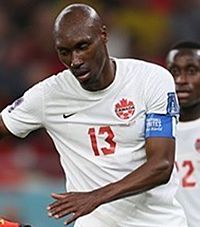
| Rank | Player | Caps | Goals | Years Played |
|---|---|---|---|---|
| 1 | Atiba Hutchinson | 104 | 9 | 2003–present |
| 2 | Julián de Guzmán | 89 | 4 | 2002–2016 |
| 3 | Paul Stalteri | 84 | 7 | 1997–2010 |
| 4 | Randy Samuel | 82 | 0 | 1983–1997 |
| 5 | Dwayne De Rosario | 81 | 22 | 1998–2015 |
| 6 | Mark Watson | 78 | 3 | 1991–2004 |
| 7 | Milan Borjan | 73 | 0 | 2011–present |
| 8 | Lyndon Hooper | 68 | 3 | 1986–1997 |
| 9 | Alex Bunbury | 66 | 16 | 1986–1997 |
| Samuel Piette | 66 | 0 | 2012–present |
Top Goal Scorers
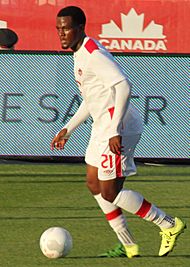
| Rank | Player | Goals | Caps | Ratio | Years Played |
|---|---|---|---|---|---|
| 1 | Cyle Larin | 28 | 61 | 0.46 | 2014–present |
| 2 | Jonathan David | 25 | 41 | 0.61 | 2018–present |
| 3 | Dwayne De Rosario | 22 | 81 | 0.27 | 1998–2015 |
| 4 | John Catliff | 19 | 43 | 0.44 | 1984–1994 |
| Dale Mitchell | 19 | 55 | 0.35 | 1980–1993 | |
| 6 | Lucas Cavallini | 18 | 35 | 0.51 | 2012–present |
| 7 | Tosaint Ricketts | 17 | 61 | 0.28 | 2011–2020 |
| 8 | Alex Bunbury | 16 | 66 | 0.25 | 1986–1997 |
| 9 | Ali Gerba | 15 | 30 | 0.5 | 2005–2011 |
| 10 | Alphonso Davies | 14 | 40 | 0.35 | 2017–present |
| Junior Hoilett | 14 | 54 | 0.26 | 2015–present |
Team Achievements
Canada has won several important soccer tournaments.
Major Competitions
- CONCACAF Championship / Gold Cup
- Champions (2): 1985, 2000
- Third place: 2002, 2007
- CONCACAF Nations League
- Runners-up: 2022–23
Other Competitions
- North American Nations Cup
- Winners: 1990
- Summer Olympics
- Winners: 1904
- CONCACAF Olympic Qualifying Tournament
- Runners-up: 1984
Team Uniforms (Kits)
Canada's soccer team has worn many different uniforms over the years. Here are some examples of their home (first colours) and away (secondary) kits.
|
||||||||||||||||||||||
|
||||||||||||||||||||
Kit Makers
Different sports brands have made Canada's uniforms over the years.
| Brand | Period |
|---|---|
| 1986–1992 | |
| 1993–1995 | |
| 1996–1998 | |
| 1999–2010 | |
| 2011–2018 | |
| 2019–present |
See also


